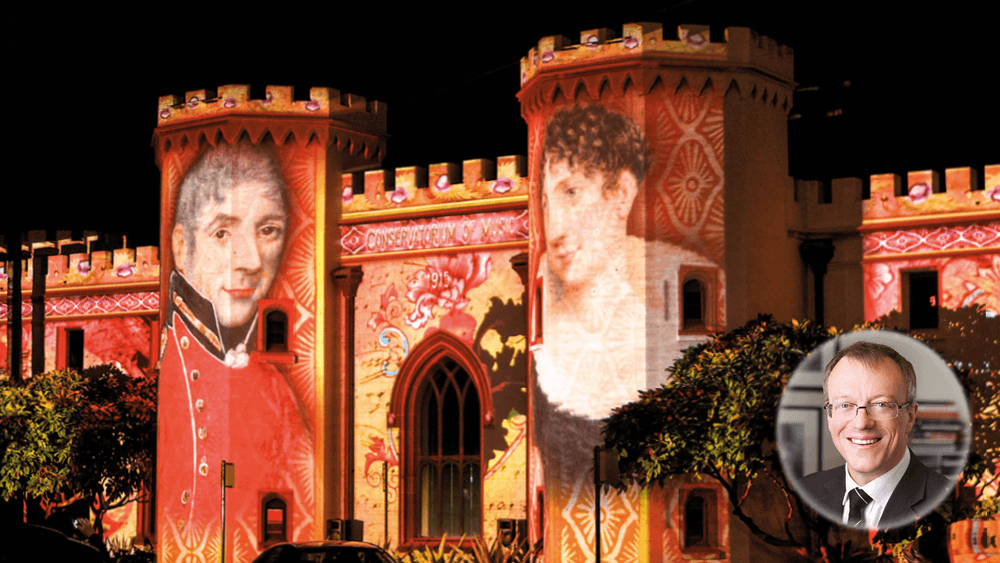If, some day early in 1817, the devout wife of the more swashbuckling Governor Macquarie, Elizabeth Henrietta, formerly of Airds in Scotland, hadn’t rolled over on her pillow and suggested to the Governor that the new colony, hard but hopeful, needed Bibles right now, quickly, to find a place down at its still exposed bedrock, then …
We might not have seen the rapid rise of schools, places where children would be given a chance to flourish, where the first task was to form them around the knowledge of God, so that they would also know themselves, along with this wild world in which they were now found? And we might not have seen Australian girls and boys, all believed to be in the image of God, learning to think God’s thoughts after him.
And we wouldn’t have heard the words spoken, week after week, in churches across the sprawling New Holland, just about to become ‘Australia’, that it was right to respect those in authority over you, but that it was also right and very important that a man and a woman know that in Christ they can be free indeed. And that dynamic wouldn’t have shaped who we are as a nation.
73 per cent of indigenous Australians describe themselves as followers of the living Word, Jesus Christ.
And if, along with their dreadful diseases and cultural impositions, Christian missionaries hadn’t headed inland, armed more with a message than a weapon, bringing to life an idea of God that many mobs felt was lying quietly somewhere in their dreaming, slowly, slowly finding indigenous words for ‘shepherd’ and ‘temple’ and ‘atonement’, then the statisticians today wouldn’t be able to say that 73 per cent of indigenous Australians describe themselves as followers of the living Word, Jesus Christ.
And Alfred Deakin couldn’t have desired “a Christlike citizenship”, nor could Sir Henry Parkes, drafting our constitution, have remarked that our whole system of jurisprudence is “interwoven with our Christian belief.” Nor could Governor-General Sir Isaac Isaacs have written of the Bible that “individuals and nations alike proclaim their own character and mould their own destiny by their attitude to its sublime teachings.”
It may be hard to believe, but without the Bible, we wouldn’t have an Australian insurance industry. Or, better put, an assurance industry, because that is the Christian word that drove the founding of the AMP. This great institution’s acronym stands for Australian Mutual Provident, a biblical term for what Galatians 6 describes as bearing one another’s burdens, the assurance of comfort and support when everything is falling apart.
Without all of these Bible-influenced cultural phenomena, we don’t have our Australia.
One of the founders, Thomas Holt, described the philosophy of such an organisation in his book, Christianity, the poor man’s friend. If only that were still the guiding vision of insurance work!
Nor would we have seen Arthur Boyd paint Adam and Eve, or Albert Tucker Judas, or John Coburn his Tree of Life. Nor Arthur Stace chalk Eternity on the pavements of Sydney and Melbourne (nor the Sydney Harbour Bridge at the turn of the millennium, nor this news service…). Nor the Walls of Jerusalem Park in Tasmania, nor steeples, nor crosses or crucifixes, nor monuments to Mary nor statues of the saints. They all find their genesis in the written Word, winging its way at Mrs Macquarie’s request, from Jerusalem to Judea, from there to Britain, and to here, the ends of the earth. Without all of these Bible-influenced cultural phenomena, we don’t have our Australia. And we wouldn’t have wines from South Australia delighting our palates, with names like ‘Hill of Grace’, that too lovely descriptor of the blood of Calvary, or ‘Shadrach’, ‘Meshach’, ‘Abednego’ and even ‘The Holy Trinity’, or ‘St Anything’, and wouldn’t that be a loss.
Mrs Macquarie, and all of Australia’s servants of the Word, we thank you.
And I, along with my adult children, wouldn’t be intrigued by Nick Cave who, having devoured the Bible during his youth, at his concerts this year continues to sing about an elusive Kingdom, and an electric chair known as the ‘Mercy Seat’, and Forgiveness’s stand-off with Revenge, and his own wrestle with the Christ he says he has never met, and the God who never intervenes, and the tragic death of his own son, who he believes is no longer. I wouldn’t be saying to my sons that you need to have real reasons to hope in the idea of life beyond the grave. And the Bible gives them to you.
And my young daughter wouldn’t be asking me as she falls asleep at night, “Dad, how do we know what God looks like?”, and I wouldn’t be capable of answering, “Sweetheart, we find out by reading from this Bible here and it tells us that he looks just like Jesus.”
Mrs Macquarie, and all of Australia’s servants of the Word, we thank you.
Greg Clarke is CEO of Bible Society Australia.

